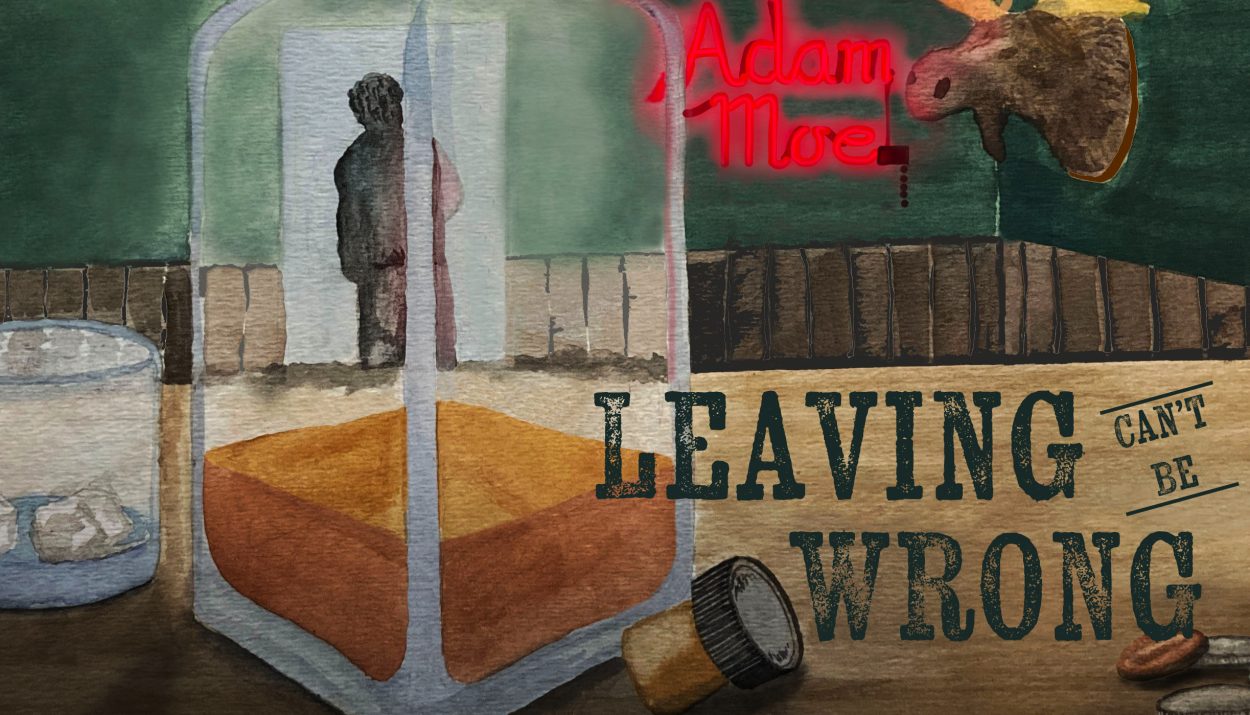Few artists craft intimately honest and soulful songs as Adam Moe. A fiddler, singer, and storyteller from Duluth, MN, his voice is the kind of instrument that pulls at your heartstrings with every note. After years of honing his craft with the folky-tonk duo Pushing Chain, Moe has transitioned to a solo career, “Leaving Can’t Be Wrong” is the culmination of that evolution. The album is a compelling portrait of a man navigating life’s trials, triumphs, and all the messy middle parts in between. With lyrics that feel like confessions whispered into the late-night air and a delivery that aches with lived experience, his debut solo album feels like sitting at the bar with a stranger who knows exactly what you’re going through. Let me tell you more.
“Some Days” opens the collection with hushed intimacy. The song’s confidence lies in its restraint: gentle guitar strums, soft percussion, and ambient textures form a warm, acoustic cocoon. Moe’s voice is soft and contemplative like he’s sitting across from you, candlelight flickering, sharing truths too heavy for daylight. “Some days I know half of everything. Some days it’s the other half” is more than just lyrical wit; it’s a call for the emotionally honest. When he sings, “Most days I just count my blessings. ’Cause I open my eyes and you’re there,” the vulnerability turns luminous. It’s a sigh of a song, not a shout—and therein lies its power.
With “Beggars Can’t Be Choosers,” Moe leans into his honky-tonk heritage with a slow-burning confession soaked in melancholy and whiskey. His delivery is raw and unfiltered, like a man too tired to lie to himself anymore. “I don’t like gin. But I like being sober even less” hits like a late-night truth bomb, while the acoustic textures, brushed percussion, and mournful fiddle underscore the song’s vulnerability. Moe doesn’t seek pity in this song, he offers companionship in sorrow.
Next comes “Blue Skies and Highways,” an ode to the working class, the long haul, and the quiet joy of coming home. With acoustic strumming, steel guitar flourishes, and Moe’s weathered vocals front and center, this track radiates pride and purpose. Lines like “Driving truck’s my living. And making time’s my way” root the song in blue-collar realism, while “You won’t find me complaining. I’m heading home, that’s right” lifts it with hope. This is the heartbeat of everyday America, set to music.
“That’s Why They Call It Crazy” follows, turning inward with aching honesty. Moe sings like he’s teetering on the edge, his voice trembling as he admits, “I hear voices in the bedroom when I know that I’m the only one at home.” The production lets the emotional weight land undisturbed, and Moe’s ability to sit with sorrow—without dressing it up—makes this song quietly devastating.
Adam Moe follows that fog of heartbreak with “Lost at Sea,” a haunting ballad that feels like a whisper from the void. The sparse arrangement mirrors the lyrics’ emotional isolation—“I’m lost at sea. Don’t look for me.” Moe isn’t asking to be saved. He’s chronicling what it means to drift, untethered. The ambient textures feel like open ocean: vast, still, and full of quiet danger. His delivery is subdued, but beneath it lies a storm of resignation and poetic grace.
“Leaving Can’t Be Wrong,” the album’s title track, is the album’s philosophical anchor. Opening with the striking line, “This one horse town is out of horses,” Moe walks us through a personal exodus—less about running away, more about choosing possibility over paralysis. The instrumentation swells subtly beneath him, with acoustic warmth and steady rhythm echoing his quiet defiance. “The world’s a great big ball, and everybody dances,” he sings, reminding us that reinvention isn’t just brave, it’s necessary.
In “Fool on the Stool Next To You,” Moe plants us in a dimly lit bar beside a broken man nursing more than just a drink. His vocals are soaked in late-night sorrow, restrained but full of ache. “Yeah, I know. I been here all night. There’s no need for me to go home now,” he confesses, and you feel every second of that lonely vigil. The song is a masterclass in storytelling, delivered with a quiet that makes you lean in and feel the weight of shared silence.
“Limpin’ Home” finds Moe still walking toward some kind of redemption. “Got a mouthful of pennies and bones. Empty pockets, all promises gone” is one of those lines you want to tattoo into a songbook. His voice is tired, not just physically, but soul-deep. The production—sparse, dusty, full of breath gives the lyrics the space to unfold like a roadside sermon. Moe doesn’t cry for help. He simply lays it all out: the cost, the miles, the truth.
With “Never Fool This Fool Again,” Moe shifts from sorrow to wisdom, wielding heartbreak like a weathered sword. There’s pain in the performance, but also resilience. “She fooled me, she’ll never fool this fool again” becomes less of a lament and more of a reckoning. The production leans into classic country, complete with steel guitar twang and a slow-burning groove, but it’s Moe’s voice gravel-edged and unwavering that steals the show.
The album closes with “Where Would I Be Without You,” a song that feels like a warm hand on a cold shoulder. “Think I could live in a lighthouse… but where would I be without you” captures Moe’s gift for imagery and emotional resonance. His voice softens here—gentle, grateful, grounded. The production leaves room for every syllable to shimmer. It’s not just a love song—it’s an acknowledgment of anchorage, the kind that keeps us steady even in life’s most restless moments.
Overall, “Leaving Can’t Be Wrong” isn’t a flashy album and that’s precisely the point. Adam Moe’s genius lies in his restraint—in his ability to carve stories from silence, to make every word count. Vocally, he’s a master of nuance: never pushing too hard, but always pushing deep. His delivery balances grit and grace, and his instrumentation—acoustic, ambient, rootsy—serves the stories without ever overshadowing them. This is not an album to listen once and move on from. It’s the kind of record you return to when the world feels too loud and you need a voice that reminds you of the quiet power of being seen, of being human. So, just like me, if you are discovering Adam Moe for the first time—pull up a chair. The stories are honest. The songs are timeless. And the soul behind them? Unmistakably genuine.
Listen to the “Leaving Can’t Be Wrong Album” on Spotify
Follow Adam here for more information






